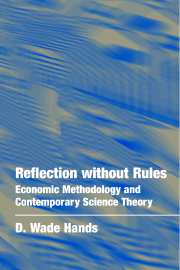Book contents
- Frontmatter
- Contents
- Preface
- 1 Introduction
- 2 The Methodological Tradition in Economics
- 3 The Breakdown of the Received View within the Philosophy of Science
- 4 The Naturalistic Turn
- 5 The Sociological Turn
- 6 Pragmatism, Discourse, and Situatedness
- 7 Recent Developments in Economic Methodology
- 8 The Economic Turn
- 9 Conclusion
- References
- Web Sites
- Index
3 - The Breakdown of the Received View within the Philosophy of Science
Published online by Cambridge University Press: 08 January 2010
- Frontmatter
- Contents
- Preface
- 1 Introduction
- 2 The Methodological Tradition in Economics
- 3 The Breakdown of the Received View within the Philosophy of Science
- 4 The Naturalistic Turn
- 5 The Sociological Turn
- 6 Pragmatism, Discourse, and Situatedness
- 7 Recent Developments in Economic Methodology
- 8 The Economic Turn
- 9 Conclusion
- References
- Web Sites
- Index
Summary
If it is true that there are but two kinds of people in the world – the logical positivists and the god-damned English professors – then I suppose I am a logical positivist.
[Glymour 1980, ix]… is a positivist, i.e., one of those who always thinks of “science” with a capital S … and use it in a context which conveys instructions pronounced in the awe-inspired tone chiefly familiar in public prayer. This emotional pronouncement of value judgments condemning emotion and value judgments seems to the reviewer a symptom of a defective sense of humor.
[Knight 1940, p. 151]Everybody knows nowadays that logical positivism is dead. But nobody seems to suspect that there may be a question to be asked here – the question “Who is responsible?” … I fear that I must admit responsibility.
[Popper 1976b, p. 88]Once, in those dear dead days, almost, but not quite beyond recall, there was a view of science that commanded widespread popular and academic assent. This view deserves a name. I shall call it “Legend.” … So much for the dear dead days. Since the 1950s the mists have begun to fall. Legend's lustre has dimmed. While it may continue to figure in textbooks and journalistic expositions, numerous intelligent critics now view Legend as smug, uninformed, unhistorical, and analytically shallow.
[Kitcher 1993, pp. 3–5]The last half of the previous chapter examined a number of economists whose methodological writings were broadly informed by “positivist” philosophy of science.
- Type
- Chapter
- Information
- Reflection without RulesEconomic Methodology and Contemporary Science Theory, pp. 70 - 127Publisher: Cambridge University PressPrint publication year: 2001



